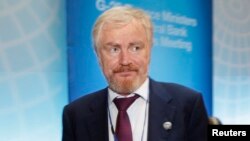Russia criticized on Thursday a decision by the European Bank for Reconstruction and Development (EBRD) to suspend further loans to the country over the Ukraine crisis and said the bank should not be swayed by "temporary political trends."
Last year the London-based EBRD, set up in 1991 originally to invest in ex-Soviet bloc countries, halted fresh lending to Russia, long its biggest market, after the West imposed economic sanctions over Moscow's actions in Ukraine.
"We are surprised and disappointed that the EBRD, being a major and prestigious international financial institution, found itself involved in the sanctions polemics and was used to ramp up political and economic pressure on our country," Russian Deputy Finance Minister Sergei Storchak said.
"It is essential that the EBRD remains a depoliticized transition institution ... We hope that the bank will not be guided by temporary political trends," he told an annual meeting of the EBRD board of governors in the Georgian capital Tbilisi.
EBRD officials were not immediately available to comment on the statement but the bank's president, Suma Chakrabarti, said last month that any decision on further lending to Russia was unlikely before the end of the year at the earliest.
Storchak linked the EBRD's 2014 net loss of 568 million euros to its decision regarding Russia.
The EBRD has been hit by a sharp drop in both the Russian rouble and Ukraine's hryvnia currency since Moscow's annexation of Crimea and its support for pro-Russian rebels in eastern Ukraine which prompted the Western sanctions.
Russia's economy has also suffered from a plunge in the price of oil, its main export earner. Earlier this year the EBRD said it expected Russia's economy to shrink by almost 5 percent
this year.
'Politically motivated'
"The results demonstrated by the bank could partly be attributed to the Board of Directors' informal decision to suspend the bank's operations in the Russian Federation, which in our view was politically motivated and was totally lacking any economic rationale," Storchak added.
"It cannot be said in every instance that the bank's clients are observing the EBRD's strict internal rules and policies regarding projects' rates of return, the priority for investments into the private sector and the transparency of operations."
Given such shortcomings, Storchak said Moscow could not support the EBRD's strategic capital framework for 2016-2020 and also opposed a proposal to maintain the existing level of
callable capital.
"The bank is not making full use of the capital resources at its disposal and in the current climate we see no reason for the steady increase of the bank's business to 10-11 billion euros," he said.
